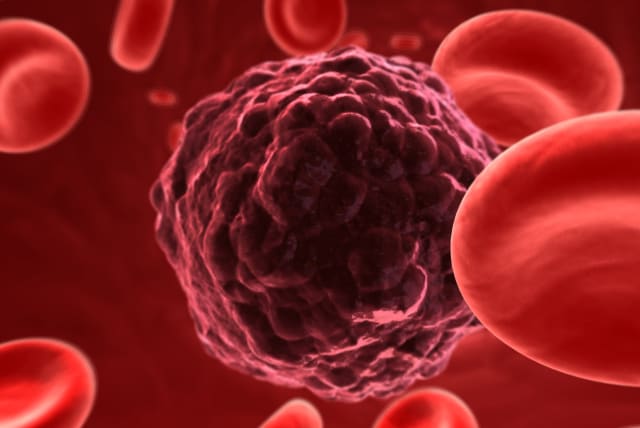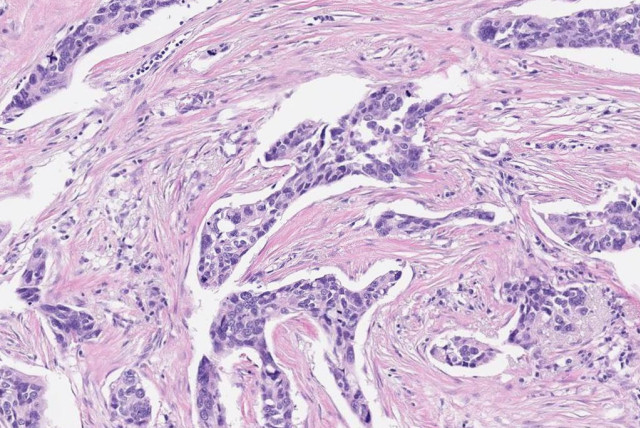Ovarian cancer: Uncommon but fatal – six things you need to know

Ovarian cancer isn't considered common, but in many cases it's fatal. Due to vague symptoms, this cancer is usually diagnosed at an advanced stage and is hard to treat.
Many women know how crucial it is to be tested yearly for early diagnoses of breast cancer because it's the most common cancer among women in Israel and around the world.
However, it's important to recognize and raise awareness of other types of cancer too. This is especially true for those that may be dangerous and aggressive and are discovered in an advanced stage.
The rates of ovarian cancer in Israel aren't high. According to data from the National Center for Disease Control at the Health Ministry, it's the 10th most common malignant disease among women. At the same time, in the field of gynecology, it ranks highest in terms of mortality.
It's important to debunk some common myths that have developed around this disease.
Ovarian cancer is diagnosed with routine screening tests, such as a Pap smear
The HPV/Pap (cervical smear) screening test is intended for the early detection of cervical cancer only and not for ovarian cancer. Today, there are still no routine screening tests in Israel or elsewhere that can detect ovarian cancer.
Ovarian cancer is diagnosed through the help of a combination of several tests like vaginal ultrasound, a pelvic exam and blood tests to identify unique proteins that, when combined, can indicate a possible cancerous tumor. Yet even with these tests, the diagnosis is still not always certain. Sometimes, whether it's really ovarian cancer can only be determined by surgery and a biopsy.
Everyone who is at high risk knows they might develop this cancer
Generally, it's believed that if someone in our family had a specific cancer, we're also at risk. This assumption is true in some cases, but definitely not in all, as in only a minority of cancer cases a distinct hereditary factor can be identified.
Any woman, regardless of background, can get ovarian cancer. Women who have a family history of dealing with ovarian cancer and sometimes breast cancer definitely have a higher risk.
In addition, women who carry the genetic mutations BRCA1 and BRCA2 are also at a significantly increased risk of breast, ovarian and other cancers depending on the specific mutation. Today, every woman of Ashkenazi origin is entitled to be tested for specific BRCA mutations as part of the Israeli health services basket.
If I am BRCA negative, I'm safe from ovarian cancer
Not exactly. In the initial stage, a standard blood test will check for common BRCA mutations and dozens of more common mutations in Israel. If no mutations are found, it might be recommended to perform an extended panel that includes full gene sequencing to identify possible mutations.
It's important to emphasize that these gene mutations are most common among Jewish women of Ashkenazi origin (one in 40), but genetic defects can also appear in any woman, and many women diagnosed with ovarian cancer aren't BRCA carriers.
Ovarian cancer can only be diagnosed in advanced stages
In most cases, ovarian cancer is detected at stages 3 and 4, which are considered the most advanced, but in cases where the disease is detected at an earlier stage, it's easier to treat it. Unfortunately, symptoms of ovarian cancer in its early stages are vague and more general like abdominal pain, bloating, discomfort in the digestive system and so on.
This is why most women don't attach any importance to these symptoms and don't turn to tests and diagnoses until it gets worse.
It's important to be alert for symptoms like unusual abdominal pain that persists for several weeks, pelvic pain, swelling, unexplained weight gain or loss, or severe chronic fatigue.
Removing ovarian cysts can prevent cancer
Most ovarian cysts detected in routine tests are harmless and are expected to go away on their own without surgery. In most cases, especially during childbearing years, these cysts are benign, meaning that they don't indicate cancer.
Cysts usually don't need to be removed if they don't cause any abnormalities, but in some cases, removal is recommended if they cause pain or if they grow and change in appearance. Of course, each case needs to be managed individually. For any cyst, it's important to be under medical supervision to ensure that a thorough, responsible decision is made.
A hysterectomy reduces the risk of ovarian cancer
Women who have had a complete hysterectomy (uterus and cervix) or a subtotal hysterectomy (uterus without cervix), usually for benign reasons, don't lower their risk of ovarian cancer.
Today, it's customary to remove the fallopian tubes as well to reduce the risk of cancer. In benign cases before menopause, it's standard to leave in the ovaries since they produce hormones women need.
If the ovaries are removed, the risk of developing cancer decreases considerably, but it still exists. This is because there's a small chance that before the ovaries were removed, cells migrated to other areas of the pelvis and at some point became or will turn into cancerous cells or a tumor similar to an ovarian tumor developing in the peritoneum, the inner lining of the abdominal cavity and organs.
Unfortunately, ovarian cancer is still considered a very harmful disease, and there still isn't a reliable screening test. Because of this, it's always important to be attentive to your body, recognize unusual symptoms and go to a doctor to check any concerns.
Usually, nothing serious will be found. But if it's cancer, early detection can help one start treatment at an early stage. This will dramatically improve their chances of recovery and improve their quality of life.
Also, all women of Ashkenazi origin (even only partially) should go to their health fund and ask for tests to be screened for BRCA mutations. This free test may save your life.
The author is the chair of the Israeli Society of Gynecologic Oncology and the director of the Women's Division and the Gynecologic Oncology Unit at the Shamir Medical Center (Assaf Harofeh).
Jerusalem Post Store
`; document.getElementById("linkPremium").innerHTML = cont; var divWithLink = document.getElementById("premium-link"); if (divWithLink !== null && divWithLink !== 'undefined') { divWithLink.style.border = "solid 1px #cb0f3e"; divWithLink.style.textAlign = "center"; divWithLink.style.marginBottom = "15px"; divWithLink.style.marginTop = "15px"; divWithLink.style.width = "100%"; divWithLink.style.backgroundColor = "#122952"; divWithLink.style.color = "#ffffff"; divWithLink.style.lineHeight = "1.5"; } } (function (v, i) { });


